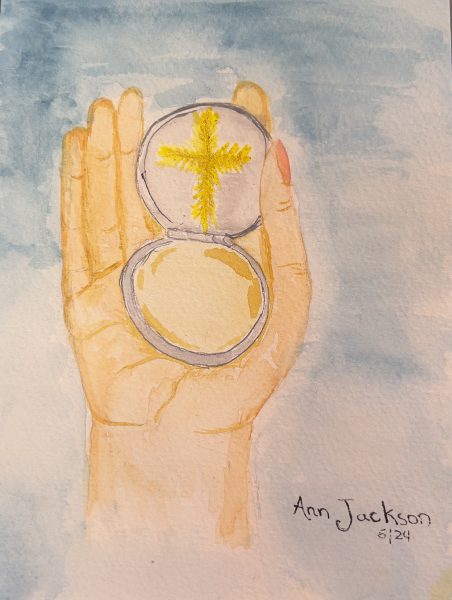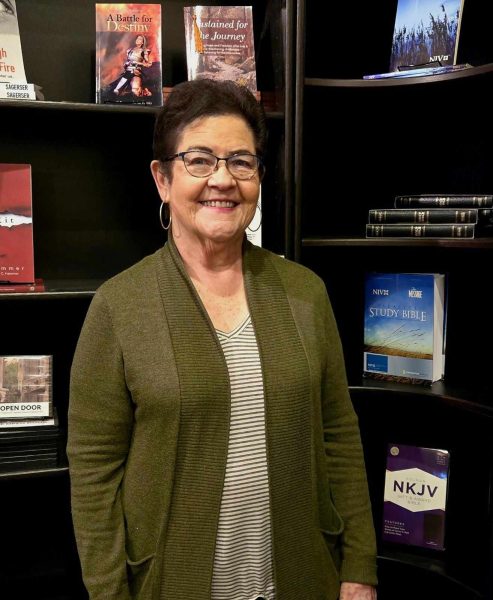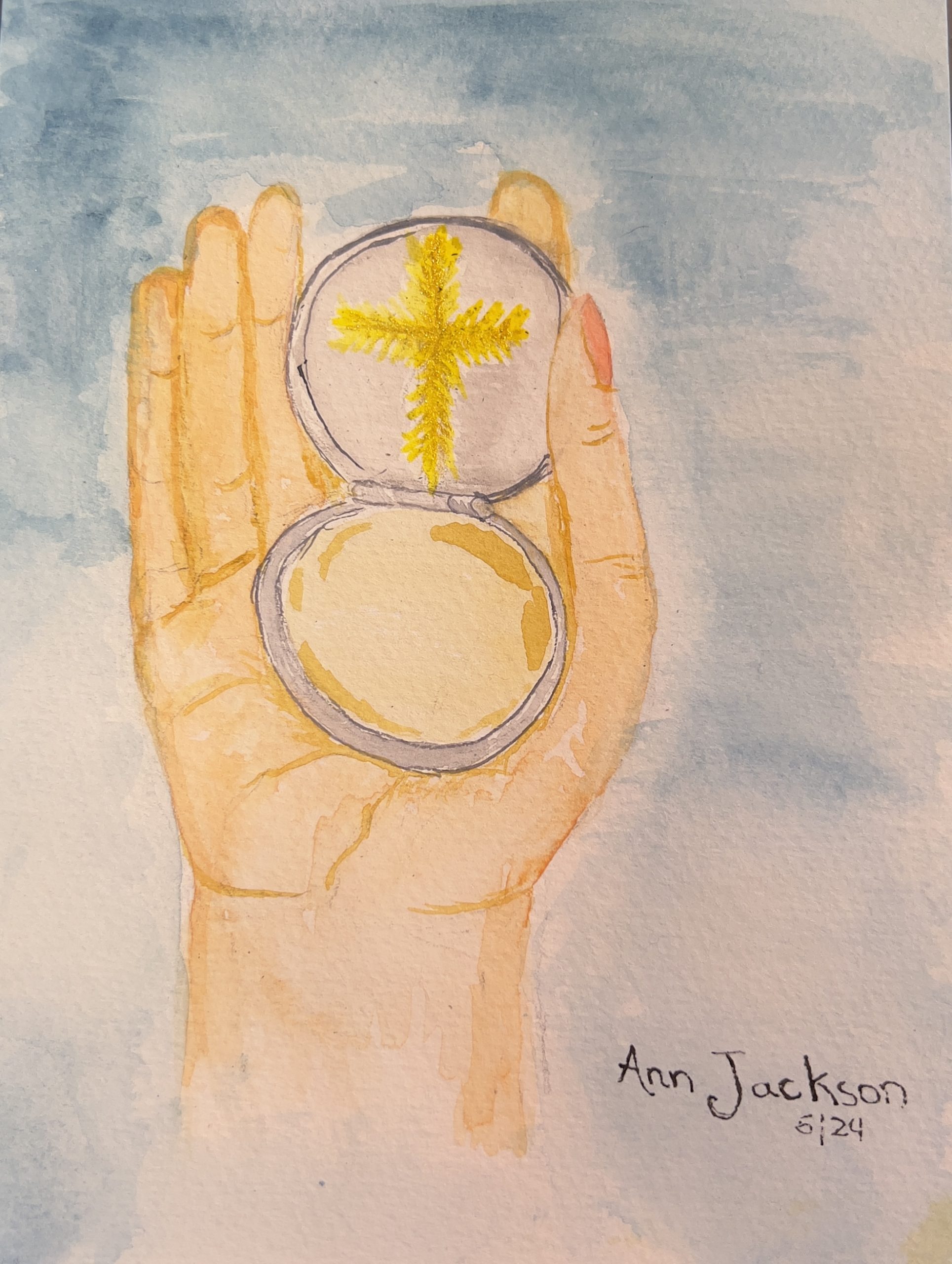(A father’s conveyance of The Father’s grace-gift)
My parents were committed to a denomination that taught and practiced a life of holiness through legalistic structure and doctrine. The scripture engraved on my mind at a young age was John 17:14-15 where Jesus said, And the world hates them because they do not belong to the world, just as I do not belong to the world. I’m not asking you to take them out of the world but to keep them safe from the evil one. In our home, this was interpreted as being in the world but not of it. You must live here, but you do not have to be worldly! With an honest heart, my parents wanted to ensure they protected me from the evil one.

watercolor by Ann Jackson
But in so doing, I was not allowed to participate in activities such as skating, bowling, and school dances like other Christian kids could; my peers often viewed me as an outcast. So, based on the scripture above, it’s no big deal that my peers ignored me because the world ignored Jesus, too, right? Well, not so much so when you’re a teenager just longing for peer acceptance. There was also a rigorous dress code for church and everyday life, so my classmates often shunned and bullied me due to my appearance. One way I compensated for that was to be the best scholar in the class, so my teacher recognized me and set me on an academic pedestal. I learned to perform to gain acceptance from my peers, even though my performance sometimes dishonored God.
During the first year of high school, I struggled desperately to balance being true to my faith and not looking like a weirdo to my peers. As I stood on shaky spiritual ground, Jesus reeled me in by embedding my understanding of concepts such as God’s grace deep within my heart, ushering it from head knowledge to heart wisdom. I knew the biblical definition of grace well, “unmerited favor,” or something given to someone by God when it is not necessarily deserved or earned.
Though I had experienced God’s grace gift during my conversion, I hadn’t embraced it beyond that. However, God often utilizes earthly experiences to define heavenly concepts better. And he did just that when he knew it was time for me at age 14 to have that aha moment (a moment of sudden realization, inspiration, insight, recognition, or understanding) of experiencing God’s grace through someone else.
Routine and structure have always been boring for me. Because I vehemently resisted this duo, my parents labeled me “a rebel with a cause” during childhood. Daily chores on a 40-acre farm occupied most of my time before and after school and on the weekends, so I had menial spare time. I remember daydreaming while hoeing weeds and stacking wood, yearning for breathing room to try something different or do something new. The other part of structure and routine was the conservative denominational standards and performance expectations that influenced my life.
An example of performance expectations relates to prayer. Teenagers in the church were required to participate when called upon to pray at the midweek adult prayer meeting. I would spend the first part of the week practicing what I would say when I prayed. I wanted to ensure I had all the spiritual jargon—the thee’s, thy’s, and thou’s rehearsed so I would impress leadership. Thus, prayer was launched from a performance platform–praying from my head and not from the heart of God.
I got my break from the routine and ordinary when I was 14. As I headed into town for high school, I thought, “Yes, I have arrived!” The 20-minute bus ride and free time for lunch allowed me to become better acquainted with two friends from grade school. Being thrown into an action-packed high school environment finally granted me space and the opportunity to try new and exciting things, the chance I yearned for.
One day, as my friends and I were eating lunch, one of them mentioned to the other that she had run out of makeup and needed to steal some more from the store. Wide-eyed, I asked, “What did you say? “To which she replied, “You know—shoplift.” “Shoplift? What is that?” The girls could not believe I had never heard of nor participated in shoplifting, so they said, “Tomorrow during lunch, let’s go to the dime store around the corner from the school and get some “free” makeup.” Then one turned to me and said, “We dare you to shoplift and not get caught!” I seldom turned down a dare, especially if it afforded me approval, so in my naivety, I agreed. I had no clue what the consequences might be but knew there was some risk when they said, “. . .and not get caught.”
Now, as a side note, makeup meant nothing to me as I was not allowed to wear it. But I was intrigued by the opportunity to impress my friends. The next day at the store, I first observed as I watched my friend, swift of hand, slide selected makeup into her purse. Lesson applied; I mimicked her swift handedness. Outside the store door, we sighed in relief as no one caught us. I had such a feeling of exhilaration for having proved myself to my friends! Then, that night, as I lay in bed, it hit me. And a wave of guilt swept over me. I burst into tears as I lay there under conviction and knew that I had to tell my parents right then and ask for forgiveness. I had broken God’s law and the law of the land; I was, in essence, a criminal!
I did not know my father well, even at age 14. I saw him very little as daily farm chores devoured his time before he left for work and even more chores when he returned home. However, one thing I knew well about my father was that he loved Jesus. He got up early each day for a time of devotions, and consistently, after dinner every night, we would have family devotions before heading off to bed. But I best knew him when my mother said (during one of my rebel-with-a-cause moments), “Just wait until your father gets home!” And I knew the sternness of that statement was a verdict for punishment and a walk-of-shame lecture as my father disciplined me. So, my “quality” time with my dad personified a heavy-handed father who ran a tight ship.
I was shaking in my boots that night as I entered my parent’s room, knowing I deserved punishment. But the look of dismay on their faces as my parents saw me so broken was overwhelming. I explained to them what had happened at the store—expecting the worst. But instead, there was an uncomfortable silence.
As I looked up, I saw tears in their eyes. I felt shame as I realized how badly I must have disappointed them. While expecting the worst, my father said, “You know you have to make that right, Joyce.” I said, “I know, Dad; I’ll take the makeup back on Monday when I go to school.” Again, hesitating, he looked at me and said, “Joyce, I’ll go with you tomorrow. Let me stand by you because that will be hard to do.” At that moment, I experienced unmerited grace. I deserved chastisement, but just as the Good Shepherd cradles an injured lamb in his arms and carries it to safety, my father also showed tenderness, willing to carry me through this difficult time.
Dad accompanied me to the store the following day, and we met with the manager. I handed her the makeup, expecting the police to show up and to be overcome with shame as I walked out in handcuffs under the gaze of shoppers I knew. Instead, the manager looked at me thoughtfully and said, “There is no teenager in this town I would trust more than you right now. We will be taking inventory at our store next week after school. Would you take a paid position and do that?”
This experience changed my life forever. I remember thinking, “So that’s what God’s grace feels like—unmerited favor by both my father and the manager.” Regardless of what I deserved through my actions, God instead freely showered me with grace. That experience transformed my relationship with my earthly father. My relationship with my heavenly father deepened, too, as my head knowledge of grace was converted to an eternal understanding within the depths of my heart. Billy Graham sums up the progression of grace from head to heart as follows: Yes, the grace of God is a reality. Thousands have tried, tested, and proved that it is more than a cold creed, a docile doctrine, or a tedious theory.
In 1 Peter 4:10 (NLT), we read: Each of you should use whatever gift you have received to serve others as faithful stewards of God’s grace in its various forms. My father understood that one of the best gifts of grace we can extend to others is responding to something they might share without vindictiveness, judgment, or malice; instead, we should speak to them just the opposite of what they expect.
Heavenly Father, thank you for the grace-given gifts we did not earn but were divinely imparted by your grace. Thank you for Christian fathers who care enough to take the time to represent you well as they help their children understand how to walk out your gifts in a practical way. Amen
Of More Excellent Worth a poem by Joyce Olsen

“Let Your Light Shine” watercolor by Amy J Heath
Of More Excellent Worth a poem by Joyce Olsen
Father, what have you given me to hold that’s of more excellent worth than silver or gold?
Ah–that talent, a lifeless ember mired in dormancy hidden somewhere within the depths of me!
Revival, I pled, while that smoldering ember beckoned me to repent for what I’d held,
hindering revival to spread. But you are a God who abundantly pardons that which I’ve held that you yearn to garden.
Father, accept my repentance for the fog of complacency that has dimmed the flare of your purpose in me.
Holy Spirit, stir to life passion and vibrancy as you fan this flameless ember to full potentiality.
Then equipped to go, through you I’ll flow, darkness banished by the light of your glow.
Souls awakened to your mercy and love, embracing salvation from the Son above.
Holy Spirit, use me

Joyce Olsen (Sonrise Magazine Editor) Author. Majored in Child Psychology and Elementary Education at Biola University and Fresno State University in California. However, her natural bent seemed to better match business and administration. In those fields, she worked in corporate administration, church administration, and also as an Information Security Analyst in the medical field. The focus of her writing is to inspire and provoke thought.

Leave a Reply